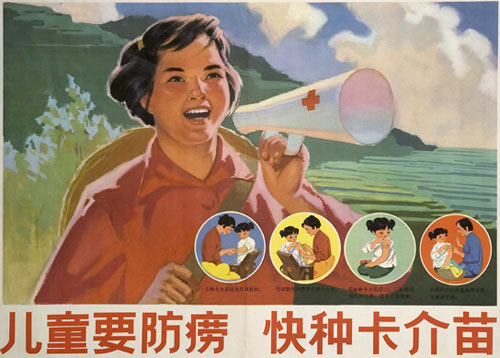
Maoist public health poster. Source: www.medhealthinsurance.com
Christiaan Tuntono and Dong Tao of CSFB reported today on the only health care reform taking place in the G-2 at the moment, this one in China (see article below). In the workers’ paradise in East Asia, such welfare state fundamentals as health care, social security, and unemployment insurance are not provided extensively by the state. This lack is one of the culprits, according to economists, behind China’s sky-high household savings rate that keeps consumption depressed and current account surpluses with the US and others (and therefore China’s fx reserves) in the stratosphere. Chinese households themselves must save for health care, retirement or job loss. China is implementing a pilot public hospital program, taking baby steps, designed to yield universal health care by 2020. This reform is not stuck in some legislature. This round of reform follows what has been viewed as a failed experiment in introducing market reforms in health care, which only pushed costs higher. Lessons for America? Not sure, but have a read of the CSFB report below…
China
Dong Tao
+852 2101 7469
[email protected]
Christiaan Tuntono
+852 2101 7409
[email protected]
The State Council passed the public hospital reform plan on 3 February, marking another important step in China’s healthcare reforms, in our view, and addressing the problem of over-saving among the public. This policy is in line with the healthcare reform plan announced by the State Council in April 2009, which aims to invest RMB850bn to provide basic medical services to the population by 2011, with the long-term goal of rolling out universal coverage by 2020. Each province will select one to two cities as the trial bases for setting up a public hospital network, according to the policy approved yesterday, while we think 16 small- to medium-sized cities are likely to be selected for the initial launch. In our view, China has reversed the direction of the medical reforms launched by former Premier Zhu Rongji in the late 1990s, which have been widely viewed as a failure. Zhu introduced market mechanisms to the healthcare system, hoping that they could improve efficiency, but that led to a surge in medical costs and a deterioration in service quality at hospitals. The new approach taken by the government now is to identify healthcare as a public non-profit oriented service, and hence the state will assume the main responsibility to provide this, while allowing the existence of private healthcare services. The government will provide subsidies to lower the cost of drugs and other medical fees. High medical costs have been one of the main reasons behind the Chinese population’s high level of precautionary savings. With the aim of promoting private consumption, Beijing is taking steps to address this concern. We believe more fiscal resources will be ploughed into this effort over the coming decade, raising the provision of social benefits.
In other news, it was reported by local journal China Business News that China Investment Corporation (CIC) may receive another $200bn capital injection from the Ministry of Finance. The CIC invested heavily in the second half of 2009, which could have used up a sizable portion of its initial capital. When the CIC was set up in 2007, the Ministry of Finance issued a RMB1.55trn special bond and injected the proceeds into the company as a capital base to purchase $200bn worth of foreign exchange reserves. Given that China now has over $2.4trn of FX reserves, and is expected to maintain a balance of payments surplus in the future, we believe the CIC will accelerate its pace of foreign investments with the aim of diversifying China’s reserve holdings into global blue-chip companies and natural resources.
Image: Maoist public health poster. Source: Google Images